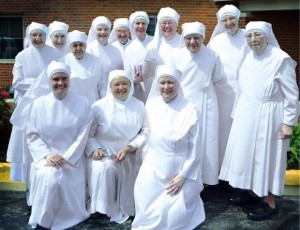 In a reply filed with the U.S. Supreme Court, the Obama administration is arguing that a group of nuns that has objected to the HHS birth control and abortifacient mandate has no grounds to challenge the mandate since they are already exempt from it as a religious organization.
In a reply filed with the U.S. Supreme Court, the Obama administration is arguing that a group of nuns that has objected to the HHS birth control and abortifacient mandate has no grounds to challenge the mandate since they are already exempt from it as a religious organization.
However, lawyers for the nuns have pointed out that in order to claim their exemption, the administration is requiring the nuns to sign a “permission slip” that would allow their insurance company to offer coverage of contraception, abortion-inducing drugs, and sterilization over the nuns’ objections.
The Sisters argue that participating in the process in any way would make them party to mortal sin. Even the fact that the government would pay the insurer for the coverage, and so costs would not fall on the Sisters, fails to address this concern, they say.
On Friday, the Department of Justice (DOJ) responded to Justice Sonia Sotomayor’s injunction protecting the Little Sisters of the Poor and other religious organizations from the HHS mandate. According to its response, the Little Sisters of the Poor have “no legal basis to challenge the self-certification requirement or to complain that it involves them in the process of providing contraceptive coverage.”
The DOJ also cited lower court decisions against the Little Sisters, saying that “both of the lower courts recognized this case involves a church plan that is exempt from regulation.” The Obama administration stated that the Sisters need only sign paperwork opting out of the mandate and that while this would then open up their insurance company to covering what the Sisters believe are sinful measure, the Sisters themselves would not be paying for anything they object to.
The mandate, which went into effect in January 2012 and has gone through several revisions, has caused a backlash among religiously affiliated non-profits and some business owners, because they say the government is forcing them to violate their beliefs against abortifacients and contraception.
In all, 91 lawsuits have been filed by religious and non-religious organizations.
In a public statement, Becket Fund for Religious Liberty Senior Counsel and Lead Counsel for Little Sisters Mark Rienzi decried the administration’s defense of the mandate.
“The government demands that the Little Sisters of the Poor sign a permission slip for drugs and contraceptives, or pay…millions in fines,” he said.
“The government now asks the Supreme Court to believe that the very thing it is forcing the nuns to do—signing the permission slip—is a meaningless act,” Rienzi continued. “But why on earth would the government be fighting the Little Sisters all the way to the Supreme Court if it did not think its own form had any effect?”
The Supreme Court is hearing two challenges to the mandate in March from for-profit organizations. The government’s response to the injunction gives Sotomayor and the Supreme Court the ability to keep the injunction in place until the cases are decided, or suspend it until the case is decided.
Reuters reports that many organizations have concerns that the administration intends to push the mandate regardless of what is decided at the Supreme Court. In November, the government said it intended to “continue to consider potential options to fully and appropriately extend the consumer protections provided by the preventive services coverage regulations to self-insured church plans.”
The Supreme Courts decision to grant the Little Sisters an injunction came after a federal judge denied their request for an injunction on December 27, 2013 – just four days before the mandate went into effect on January 1. The Tenth Circuit Court of Appeals also denied their request for an injunction on December 31, which led to the last-ditch plea to the Supreme Court.
While religious organizations and individuals across the country have sued the government over the mandate – with a great deal of success, according to the Becket Fund, with 52 injunctions granted to plaintiffs and only seven decisions going in favor of the government – Catholic-affiliated groups have led against the mandate. This is partially because of the Church’s enormous influence in American culture and politics – one-sixth of hospital beds in America are Catholic, and six of the nine Supreme Court justices are Catholic, as are the Speaker of the House and the House Minority Leader.



